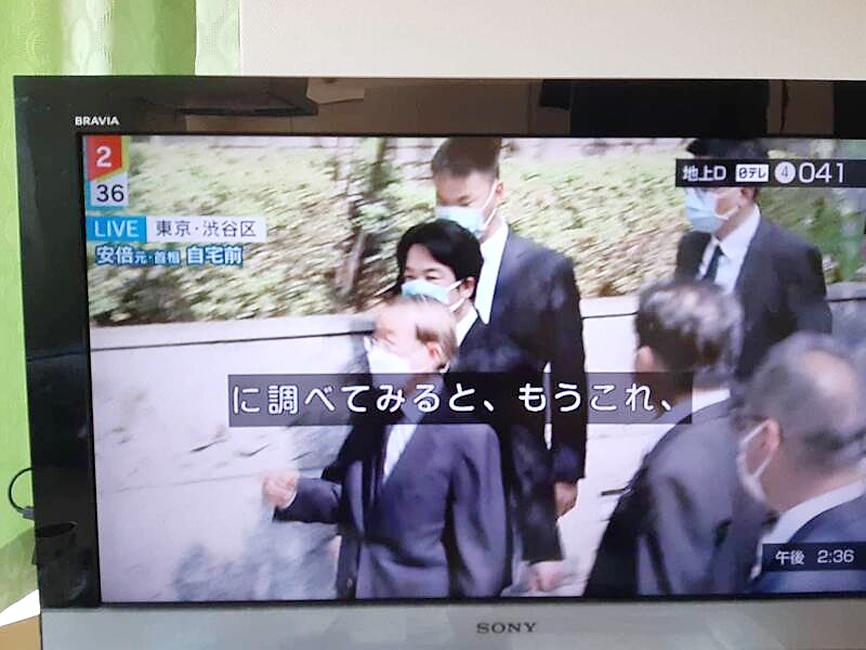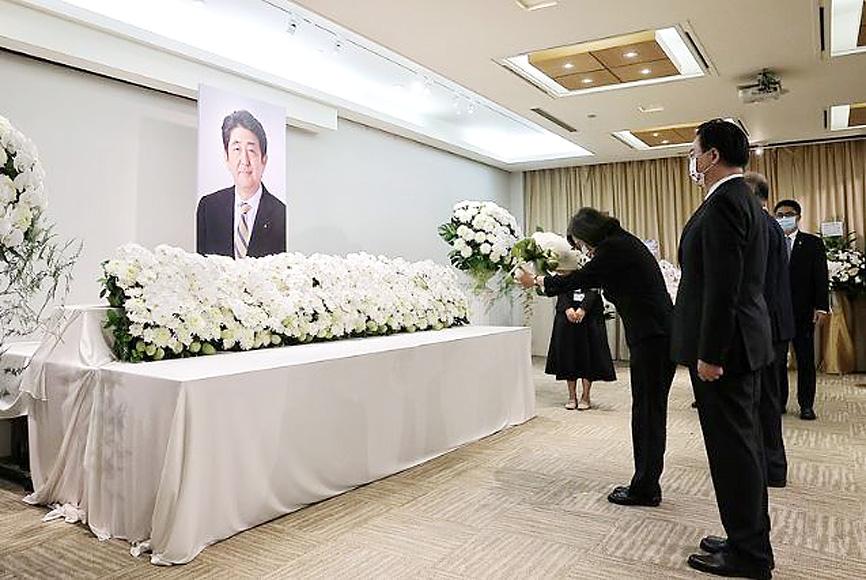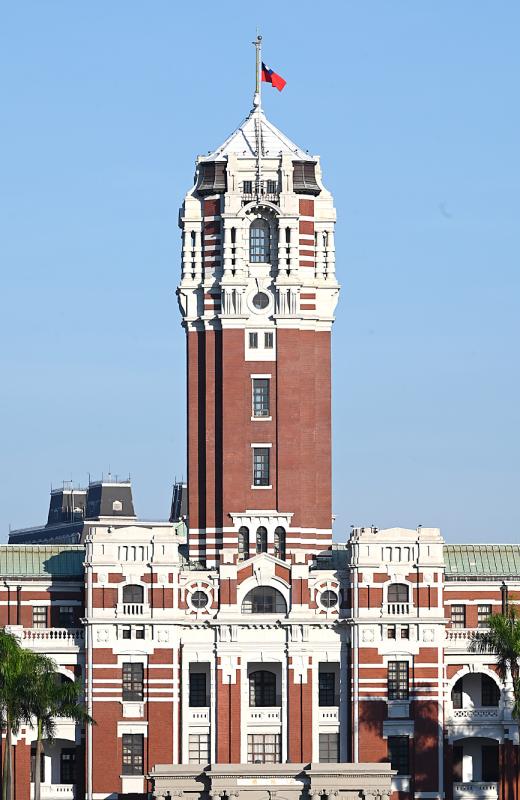Vice President William Lai (賴清德) yesterday became the most senior Taiwanese official to visit Japan in five decades when he traveled to Tokyo to offer condolences after the assassination of former Japanese prime minister Shinzo Abe.
Tokyo broke official ties with Taipei in 1972 and established relations with Beijing.
Lai’s visit was regarded as a part of his “personal itinerary,” based on a tacit understanding between Taiwan and Japan, sources said.

Photo: screen grab from Twitter
The Ministry of Foreign Affairs said it had no comment on Lai’s personal schedule.
Japanese TV news footage showed Lai, accompanied by Representative to Japan Frank Hsieh (謝長廷), visiting Abe’s residence in Tokyo to offer his condolences.
Lai is scheduled to attend Abe’s funeral today, the sources said.

Photo courtesy of the Presidential Office
The Japanese Ministry of Foreign Affairs was not immediately available for comment.
Although Tokyo has no formal diplomatic ties with Taipei, some senior Japanese officials have become increasingly outspoken in their support for Taiwan in the past few years.
In Taipei, President Tsai Ing-wen (蔡英文) offered condolences in a visit to the Japan-Taiwan Exchange Association (JTEA) yesterday morning.

Photo: Tien Yu-hua, Taipei Times
Abe, the longest-serving prime minister in Japan, died on Friday at the age of 67 after he was shot in the back that morning while campaigning on the street in the city of Nara for the Diet’s upper house elections held on Sunday. Police arrested a 41-year-old male suspect who allegedly shot Abe with a homemade shotgun.
Tsai has ordered flags to be flown at half-staff yesterday to honor Abe, who was widely considered in Taiwan to have contributed to bilateral ties.
Tsai yesterday said she was offering condolences to Abe’s family of behalf of the government and the people of Taiwan.
She said she clearly remembers Abe’s warm smile and greetings as they spoke during an online meeting in March, adding that they had expressed the hope of meeting in person soon.
“Thank you for your contribution to the friendship between Taiwan and Japan as well as to the world’s democracy, freedom, human rights and peace,” Tsai wrote on a memorial wall set up by the JTEA.
Abe will be “the good friend of Taiwan forever,” she wrote.
Tsai was accompanied at the JTEA by Presidential Office Secretary-General David Lee (李大維) and Minister of Foreign Affairs Joseph Wu (吳釗燮). They were welcomed by Japanese Representative to Taiwan Mitsuo Ohashi.
Premier Su Tseng-chang (蘇貞昌) and Legislative Speaker You Si-kun (游錫堃) separately visited the JTEA to offer their condolences.
Su said he was grateful for Abe’s assistance in facilitating the donation of millions of AstraZeneca COVID-19 vaccine doses from Japan to Taiwan last year, when Taiwan was facing a shortage of vaccines.
Abe repeatedly voiced his support for Taiwan whenever the nation faced political suppression by China, even saying the US and Japan could not idly stand by if Taiwan were attacked by China, Su said.
You said he met with Abe several times when he visited Japan, adding that the former prime minister received him in person.
Even when the Democratic Progressive Party was in opposition from 2000 to 2008, Abe still received him in his office, You said, adding that the gesture touched him.

The Central Election Commission has amended election and recall regulations to require elected office candidates to provide proof that they have no Chinese citizenship, a Cabinet report said. The commission on Oct. 29 last year revised the Measures for the Permission of Family-based Residence, Long-term Residence and Settlement of People from the Mainland Area in the Taiwan Area (大陸地區人民在台灣地區依親居留長期居留或定居許可辦法), the Executive Yuan said in a report it submitted to the legislature for review. The revision requires Chinese citizens applying for permanent residency to submit notarial documents showing that they have lost their Chinese household record and have renounced — or have never

A magnitude 5.6 earthquake struck off the coast of Yilan County at 12:37pm today, with clear shaking felt across much of northern Taiwan. There were no immediate reports of damage. The epicenter of the quake was 16.9km east-southeast of Yilan County Hall offshore at a depth of 66.8km, Central Weather Administration (CWA) data showed. The maximum intensity registered at a 4 in Yilan County’s Nanao Township (南澳) on Taiwan’s seven-tier scale. Other parts of Yilan, as well as certain areas of Hualien County, Taipei, New Taipei City, Taoyuan, Hsinchu County, Taichung and Miaoli County, recorded intensities of 3. Residents of Yilan County and Taipei received

Taiwan has secured another breakthrough in fruit exports, with jujubes, dragon fruit and lychees approved for shipment to the EU, the Ministry of Agriculture said yesterday. The Animal and Plant Health Inspection Agency on Thursday received formal notification of the approval from the EU, the ministry said, adding that the decision was expected to expand Taiwanese fruit producers’ access to high-end European markets. Taiwan exported 126 tonnes of lychees last year, valued at US$1.48 million, with Japan accounting for 102 tonnes. Other export destinations included New Zealand, Hong Kong, the US and Australia, ministry data showed. Jujube exports totaled 103 tonnes, valued at

BIG SPENDERS: Foreign investors bought the most Taiwan equities since 2005, signaling confidence that an AI boom would continue to benefit chipmakers Taiwan Semiconductor Manufacturing Co’s (TSMC, 台積電) market capitalization swelled to US$2 trillion for the first time following a 4.25 percent rally in its American depositary receipts (ADR) overnight, putting the world’s biggest contract chipmaker sixth on the list of the world’s biggest companies by market capitalization, just behind Amazon.com Inc. The site CompaniesMarketcap.com ranked TSMC ahead of Saudi Aramco and Meta Platforms Inc. The Taiwanese company’s ADRs on Tuesday surged to US$385.75 on the New York Stock Exchange, as strong demand for artificial intelligence (AI) applications led to chip supply constraints and boost revenue growth to record-breaking levels. Each TSMC ADR represents